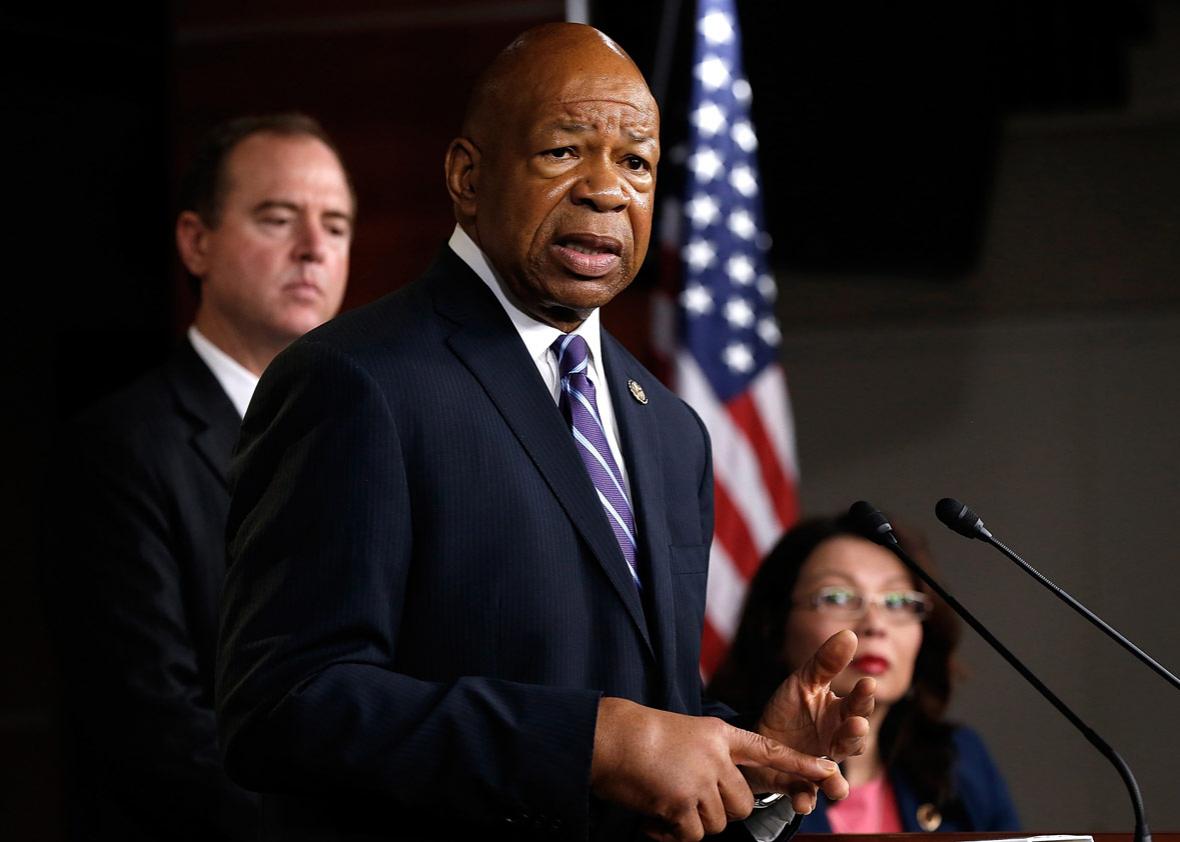House Democrats announced on Wednesday that they are trying to force a vote to create an independent, bipartisan, outside commission to investigate foreign interference in the 2016 election. The news came on the heels of the blockbuster allegation that Donald Trump instructed former FBI Director James Comey to let go of the bureau’s investigation into former National Security Adviser Michael Flynn. These Democrats are circulating a discharge petition to bring to the floor the bill introduced by Democratic Reps. Eric Swalwell and Elijah Cummings called the Protect Our Democracy Act. The proposed 12-member panel envisioned by the bill would be modeled on the 9/11 Commission and have full subpoena power. The petition would require signatures from a majority of members to bring the bill to the floor and is a way of circumventing the decision Speaker of the House Paul Ryan would otherwise make to not bring this up for a vote.
Is there any chance that this petition gets enough Republican signatures to force a vote? Not really! It will, however, provide the Democratic Congressional Campaign Committee with another talking point to use against vulnerable Republicans who don’t sign it: They refused to support an independent investigation into Russian meddling with our democracy and any potential violations by Trump.
Discharge petitions rarely work. The last successful petition came in 2015 to reauthorize the Export-Import Bank, a chief priority of big business. The previous successful discharge petition came in 2002 to bring up campaign finance reform. For a member of the majority to sign a discharge petition, he or she has to go against the express interest of the party leaders: If leaders wanted a bill to come up, they would be bringing it up themselves.
Since Ryan has not brought it up, we can infer that he does not want the Protect Our Democracy Act to come up.
Ryan told Republican members in a Wednesday meeting to stay calm and wait for the “facts” to arrive before leaping to any judgment. “It is obvious there are some people out there that want to harm the president, but we have an obligation to carry out our oversight regardless of which party is in the White House,” he said after the meeting. “And that means, before rushing to judgment, we get all the pertinent information.” Just not through an independent, outside investigation. Instead, Ryan expects to get to the truth through the ongoing House Intelligence Committee review and the Oversight and Government Reform Committee’s request for the memo Comey reportedly wrote documenting Trump’s alleged attempt to scuttle his investigation. Ryan was also downplaying the significance of that memo on Wednesday. “I’m sure we’re going to want to hear from Mr. Comey if this happened as he allegedly describes, why didn’t he take action at the time?” Ryan told reporters. “So there are a lot of unanswered questions.”
House Democrats, who were readily throwing around the term obstruction of justice throughout their announcement of the discharge petition, noted that two Republicans are already on board with the bill as co-sponsors. Those members, however, are Michigan Rep. Justin Amash and North Carolina Rep. Walter Jones, the two most idiosyncratic House Republicans. They rarely obey leadership and are frequent subjects of establishment-backed primary challengers.
It was not especially hard to get Amash and Jones on board for something like this. It would be considerably more difficult to get a third, fourth, fifth, or 22nd Republican member of Congress to sign a Democrat-circulated discharge petition for a bill authored by two Democratic members establishing an investigative panel on the Republican president’s ties to Russia.
New Jersey Rep. Leonard Lance, an endangered Republican member of Congress, told me Wednesday afternoon that he would not be signing the discharge petition. “I favor the committees of jurisdiction—the two intelligence committees—and, in addition to that, the FBI and the Justice Department” investigating any Russia allegations, he said. He added that he hopes Comey “comes before the Congress next week” to testify in open session.
“I don’t sign discharge positions,” Florida Rep. Mario Díaz-Balart, a relatively moderate member representing a vulnerable swing district, told me. “I didn’t even sign an immigration discharge petition.”
Idaho Rep. Mike Simpson said he is in favor of creating an independent commission to investigate this,and always has been. He’s worried, among other things, that when the House Intelligence Committee report comes out, “nobody’s going to believe it.” But when I asked him if he’d sign the discharge petition, he didn’t hesitate to say “no.”
“That’s not something you do,” he said.
“We need to convince enough people that it’s the right thing to do,” he went on, referring to Ryan and other members of the Republican conference. “Leadership needs to come out and say, ‘let’s put together a commission.’ ”
This needs to happen “on both sides of the aisle,” Simpson continued. “And hopefully they will! If it gets bad enough, they will.” The leadership on the Democratic side of the aisle has already decided that alleged evidence that Donald Trump obstructed an FBI investigation means that it has gotten bad enough. So Simpson is really only waiting on one side of the aisle.
Had Simpson noticed any shift in his own leadership in the last couple of days, following the various bombshell reports that have come out against Trump, that might make them more amenable to a commission?
“No,” he said. “But I haven’t been looking for one.”
